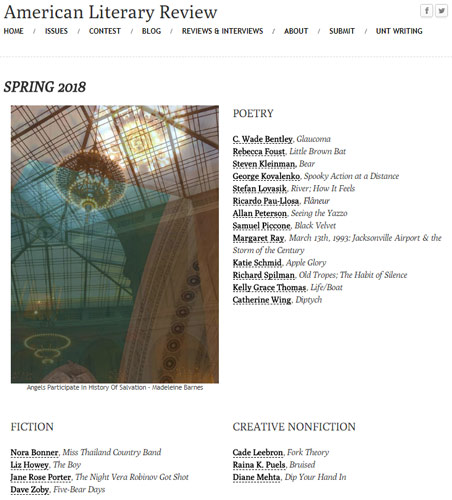American Literary Review – Spring 2018
The American Literary Review has been publishing well-crafted creative writing for nearly thirty years. In 2013, the journal published its final print issue and moved to an online format where it continues the tradition of providing exceptional writing to readers with an even more accessible format.
The American Literary Review has been publishing well-crafted creative writing for nearly thirty years. In 2013, the journal published its final print issue and moved to an online format where it continues the tradition of providing exceptional writing to readers with an even more accessible format.
Jane Rose Porter’s short story draws readers in from the title: “The Night Vera Robinov Got Shot.” Immediately, I wanted to know more. Who is Vera? Who shot her? Why? After Vera is shot at the edge of the lake in the middle of the night, her neighbors have the same questions: what was she doing out there? But Vera is asking what she’s doing anywhere, living in a foreign country with her son-in-law, not knowing the language, her daughter deceased, and her grandchild grown and moved away. Vera questions the idea of belonging—of having ownership over something, of fitting in somewhere unfamiliar, of trying to carve out a space where she can find peace. Porter answers the questions the title stirs up and then some.
Tara Deal writes about finding a new space to belong in “Mirror Finish,” winner of the nonfiction 2017 American Literary Review Award. In this piece, Deal recounts her experience in picking up the craft of metalsmithing. There’s a minimalist feel surrounding this piece, Deal giving up just little details at a time as she walks us through the discovery of her new hobby in little, quiet bursts. We peel back each minimal paragraph to discover more about her process, and I appreciated learning about something new, right along with Deal, as I read.
This issue also includes the fiction and poetry 2017 American Literary Review Award winners: Rachel Toliver in fiction and Jessica Guzman Alderman in poetry. In “The Visible World,” Jessica Guzman Alderman’s speaker tells of being on a plane during turbulence: “Our-Fathers start,” the passengers’ prayers “fill[ing] the air around me.” While people cling to prayers, good luck charms, and memories, the speaker reflects: “I mean imagination // matters when the rudder / trips against the wind.” When things get real, we each cling to our own beliefs or objects in an attempt at hope or survival.
Rebecca Foust explores another kind of survival in her poem “Little Brown Bat.” In an ode to the titular animal, Foust mentions the factors that are at play against their lives: wind turbines; pesticides; Geomyces destructans, a fungus that affects the winged creatures; humans armed with fear and brooms. She compares them to the displaced humans around us that we also treat as unwanted and approach from a place of fear. Bringing us to this point, Foust forces us to reckon with our inner fears and the treatment of others that springs from them:
That, when afraid, we revert to lessons taught in our childhood;
we shrink from the least vibration of air,we plug our ears and close our eyes against any flailing; we look
away from what we’ve been taught we can’t bear,
we avert our gaze, and when we can, we flush it away.
First encountering Foust’s poem, we expect to reconsider our reactions and treatment of animals and walk away with a reminder to extend the same treatment to humans.
Cade Leebron in “Fork Theory” is part examination of ableism, specifically as a teacher in academia, and part call to nondisabled people to do better. Sticking with the theme of academia, Leebron utilizes a format that captures attention, switching between traditional essay paragraphs and little pop quizzes that lead the reader to self-examination. By reconfiguring the idea of spoon theory into fork theory, responsibility is displaced from being piled on the disabled to being shared by the nondisabled. “[I]nstead of using a spoon like a bowl to hold and show you your ableism,” Leebron turns the sharp points of a fork outward. If you want to do better as a nondisabled person, reading this essay is a good place to start.
In the Spring 2018 issue, the American Literary Review shows why it has stuck around for almost three decades. As it has transformed throughout the years, it continues to meet its readers’ and writers’ expectations as it publishes exceptional written work.
[www.americanliteraryreview.com]






